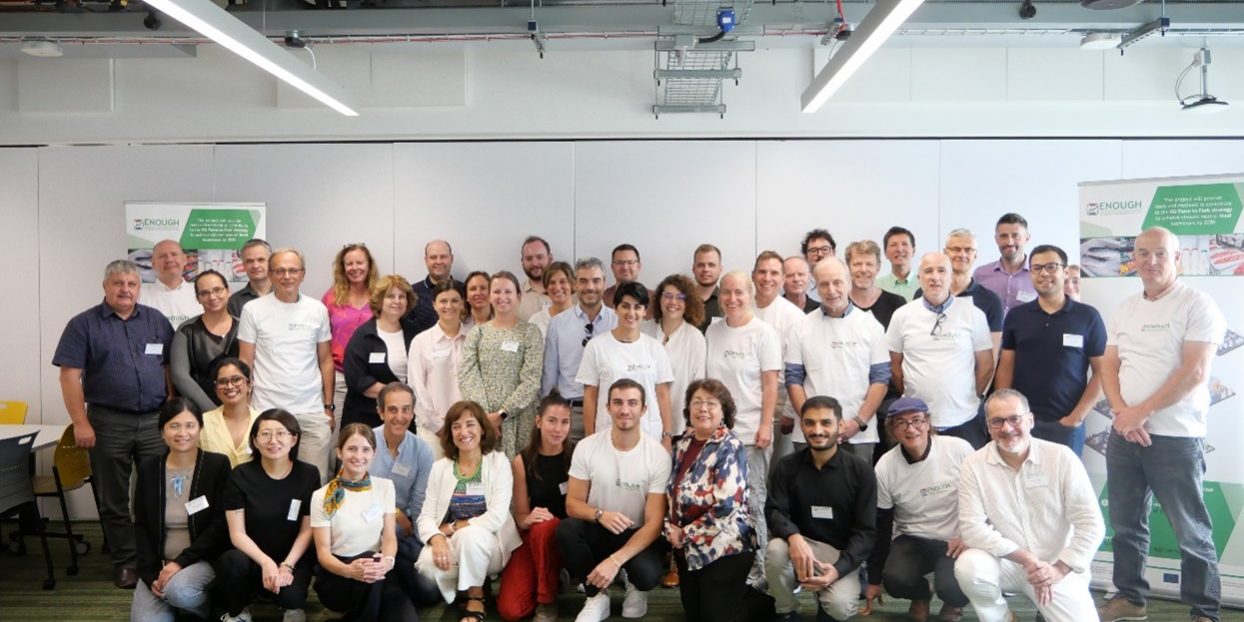The final ENOUGH workshop took place on Wednesday 13th of August, in Manchester. The first session focused on the results from the ENOUGH project, while the second session explored international collaborations and initiatives for food chain decarbonisation. On the following day, Thursday 14th of August, the ENOUGH partners met to share the project achievements, impacts, and lessons learned.
The final ENOUGH project workshop, chaired by Graeme Maidment (LSBU, UK), brought together the consortium and participating stakeholders to present the project results, achievements and lessons learned. The workshop was open for everyone interested in the topic, and the participants could also follow the event online.
In the keynote speech, Andrea Voigt (Danfoss, Belgium) emphasised that innovations in heating, cooling, and refrigeration play a significant part in sustainability, reducing emissions directly and by enabling avoided emissions through improved control and efficiency. A key challenge across all sectors is the Scope 3 emissions, and Andrea highlighted that the Refrigeration, Air Conditioning, and Heat Pump (RACHP) sector’s contribution is not yet fully recognised.
Following this, project coordinator Kristina Norne Widell (SINTEF Ocean, Norway) presented the background of the ENOUGH project, outlining its achievements and explaining the need for decarbonisation. She then gave the floor to representatives from different work packages of the ENOUGH project, allowing them to address some main results. Alan Foster (LSBU, UK) discussed calculated emissions from the European food chain and their impact using a top-down model. Judith Evans (LSBU, UK) presented different roadmaps for decarbonising the European food chain created in ENOUGH, developed using EnergyPlus software and considering a number of technologies and strategies. Silvia Minetto (CNR, Italy) described opportunities for food chain decarbonisation, introducing the 21 ENOUGH demonstrators with its different technologies adapted, implemented, and improved during the project. Denis Leducq (INRAE, France) presented mathematical modelling approaches to identify decarbonisation opportunities using the developed ENOUGH tool to simulate food supply chains. The session concluded with a presentation by Ianna Dantas (UGOE, Germany), who discussed the technical-policy nexus for food chain decarbonisation.
The second session began with a keynote speech by Tim Thurman (Gluckman Consulting, UK), who introduced the Outlook HFC tool — a global cooling emissions modelling platform for assessing greenhouse gas (GHG) emissions from refrigeration, air conditioning, and heat pump (RACHP) equipment, as well as other HFC applications. He emphasised that data analysis and modelling tools provide guidance for the impact of decarbonisation actions and policy decision making. The biggest challenges are related to the lack of data, inconsistent or misleading data.
Catarina Marques (LSBU, UK) presented emissions data from industrial, commercial, and transport refrigeration in the UK, based on the TICR project. Marco Duran (IIR, France) shared insights on international initiatives to quantify carbon emissions, and Armin Hafner (NTNU, Norway) presented practical examples from collaborations in low- and middle-income countries, drawing on the SophiA and INDEE projects. Raquel Diaz-Flores (EFFoST, The Netherlands) discussed strategies to decarbonise the European food chain, while Robert Lamb (Star Refrigeration, UK) showcased low-charge ammonia packaged systems, a technology that enables significant energy savings.
The session concluded with a debate summarising the key discussions.
Key messages from the workshop:
- The ENOUGH project is coming to an end, and the project results help to both understand and address decarbonisation challenges from a variety of perspectives.
- The food sector is a key component in achieving zero-carbon targets.
- The refrigeration, air conditioning, and heat pump (RACHP) industry must be recognised as essential to reduce greenhouse gas (GHG) emissions, improve energy efficiency, and reduce food loss and waste. The sector can also make a massive contribution to avoided
- Decarbonisation requires optimisation of the whole system, not just individual devices.
- Achieving net zero is feasible but will depend on energy grid decarbonization.
- Technologies and operations to support decarbonization are flow integration, energy storage, heat recovery, waste heat utilization, electrification of heating and cooling processes and switching to 100% natural refrigerants.
- Promising technologies already exist, but factors like local climate, grid status, and regulations influence technology selection and impact.
- Technology provides the tools to reduce emissions, while policy plays a central role in enabling innovation and scaling its adoption across sectors. Both elements must work together to enable effective and timely adoption.
- Cross-sectoral collaboration and knowledge transfer, in addition to a strong cooperation between policy, industry, academia, and society is needed to ensure the transition to a net-zero food chain.
- Monitoring and calculating emissions is key to understand the impact of our systems. However, monitoring emissions (especially scope 3) remains challenging and requires a consistent methodology and data availability.
- Increased digitalisation will improve collection and effective use of data (e.g. simulation tools) to support decision making, efficiency and transparency in the food chain.
- Even though the ENOUGH project focuses on European food chains, knowledge transfer and training on a global scale will have high impact on global emissions.
See all our presentations here.









